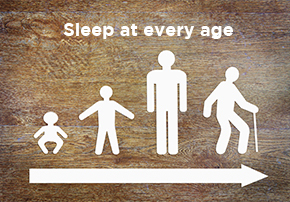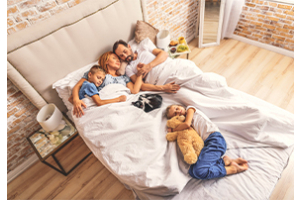Sleep at every age

Sleep At Every Age
Everyone has heard that 8 is the magic number of hours you need to sleep. While it’s true that 8 hours falls within the guidelines of 7-9 hours recommended for adults 18-64 years old, this is not a one-size-fits-all number. Throughout our lives, both our sleep needs (the amount of sleep we need to get to function at our best) and our sleep timing (when our bodies naturally choose to go to sleep and wake up) ebb and flow.
The sleep challenges of new parenthood
Any new parent will tell you that they are severely sleep deprived. So, it might surprise you to learn that newborns actually spend most of their days asleep. Up until 1 year of age, infants need between 12-16 hours of sleep. If that’s the case, then why are parents struggling to get any sleep in those early months? Well initially, this is because newborns do not have a robust circadian rhythm (a 24-hour body clock) to help them tell the difference between night (sleeping time) and day (eating and moving time).
So, for the first 6-8 weeks, parents are essentially “on call” 24 hours a day to feed, change and soothe their little one. This means that gone are the days of long, consolidated sleeps – at least for a little while. Luckily, from around two months, an infant’s circadian rhythm should kick in, making it possible to establish a routine with more unbroken sleep and wake periods.
Sleep patterns in growing children
As children age, they gradually need less sleep (although probably still more than you would think). Toddlers between the ages of 1 and 2 years old need roughly 11-14 hours including naps and preschool children between 3 and 5 years old need 10-13 hours (still including naps).
Once they hit school age (6 years old) they will no longer need daytime napping, but they should still be getting 9-12 hours of sleep at night. In terms of sleep timing, you may have noticed that children tend to be early birds. This is because their body clocks are shifted slightly earlier which is why they are often up at what feels like the crack of dawn to the poor teens and adults in the house.
Teenagers and their sleep struggles
Speaking of teens, picture this - it’s the middle of the day and your teen is only just stumbling out of their room. Sound familiar? Well, that is completely normal. They aren’t lazy, it’s just biology. There are two reasons for this: firstly, it’s because adolescents do have a long sleep need during this time. They need to get 8-10 hours of sleep. Secondly, if children are early-birds, then teens are night-owls.
During adolescence sleep timing shifts to a more evening orientation, which is why many teens are often up late into the night and only waking up later in the day. Even though they may want to go to bed at a socially appropriate time, their body is just not ready for sleep. And in the morning when they need to get up early, for them it essentially still feels like it is the middle of the night.
Stable sleep patterns in adulthood
During adulthood everything settles down a bit. Most adults find their preferred sleep timing shifts more into the realm of being a neither-type (not particularly morning orientated or particularly evening orientated but rather somewhere in between).
The guidelines for adults 18-64 years old are between 7 and 9 hours. Finally, as we get older our sleep changes once again, with our sleep timing beginning to shift earlier. Older individuals may also struggle more to fall asleep or to stay asleep.
Finding solutions for better sleep
Across all ages though, one thing remains constant: our sleep falls somewhere within a range. The amount of sleep everyone needs varies from person to person. You might be fine with 7 hours but your best friend needs 9 hours. It also changes throughout your life based on your training, health and stress. Sleep time changes seasonally. But before you automatically go “Oh, I’m definitely a naturally short sleeper” think to yourself – am I functioning at my best or would I be even better with a bit more sleep?
If you are sitting there thinking “I wish I could get that many hours of sleep” or if your sleep quality is not what it should be, contact us at www.sleepscience.co.za or email us at [email protected] to book an appointment with one of our consultants.
If it’s your bed is causing you to toss and turn, then find your nearest Dial•a•Bed store or shop online at www.dialabed.co.za. #SleepForLife!





